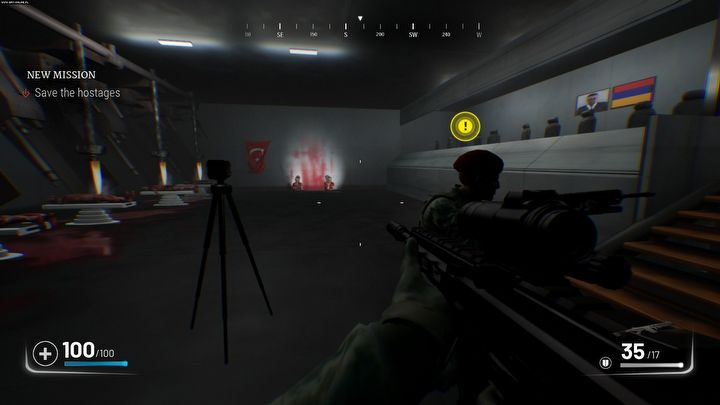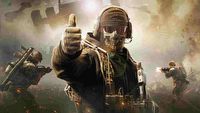Maroon Berets: 2030 - How to Sell Bad Propaganda in Even Worse Game
Turkish indie shooter Maroon Berets: 2030 is a game worth considering purely as a case study of interactive entertainment thoroughly steeped in nationalist ideology and propaganda platitudes.
7
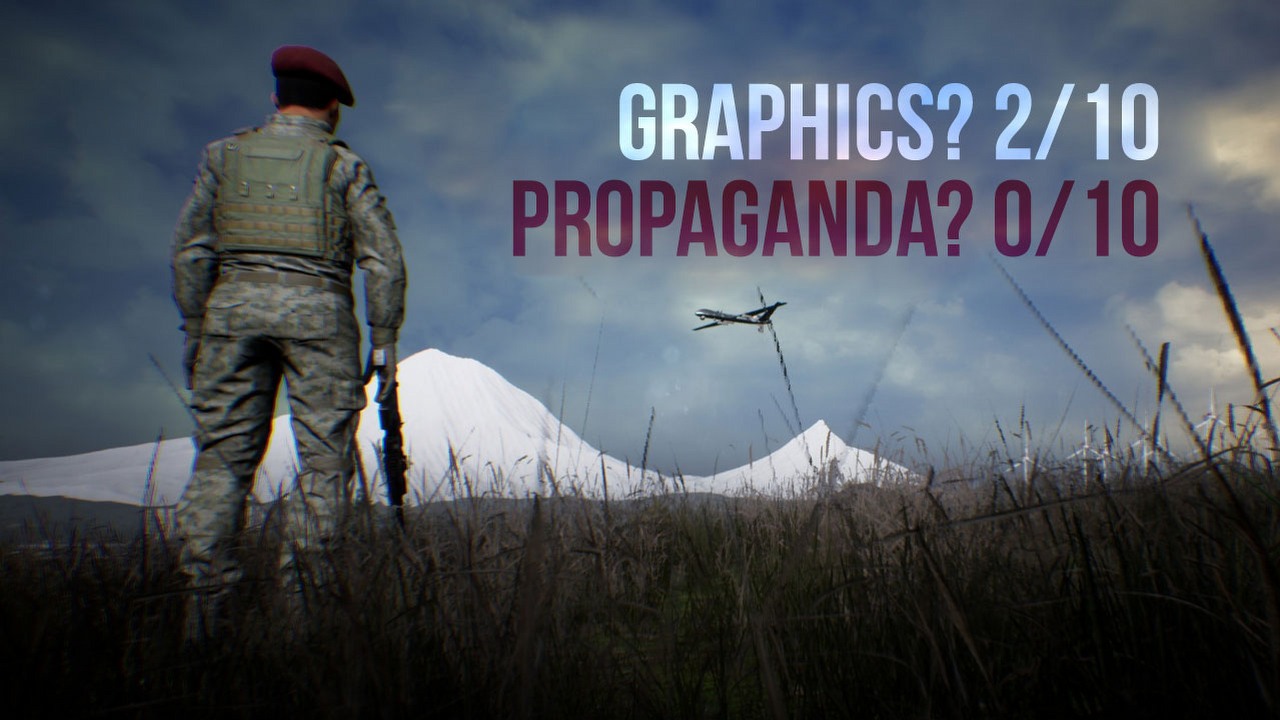
It seems absurd that a small and shitty country like Armenia is shown as a rival to Turkey. If we go to war with them, we'll take Yerevan in half an hour at most.
Even if our national feelings have been exploited, I, as a Turkish soldier, enjoy slaughtering Armenians.
I do not believe that the creation of a video game is the reason for such an extreme Armenian invasion. They show themselves in a bad light and prove that they are the savages, gangrene of the Caucasus.
The above statements is a small excerpt of an outpour of posts of similar tone that surfaced on the forums and channels of the game you might not have heard of: Maroon Berets: 2030.
For a game that, according to its developer, is "almost 100% fictitious" and does not work to further any political agenda, the Turkish shooter achieved a lot in the way of triggering bad tempers. If not for this, the game would probably have gone completely unnoticed. However, it got called out by Armenian organizations and media, which reported – untruthfully, by the way – that it depicted and justified executions of prisoners of war. And if it did go unnoticed, it would probably have been for the best, because it is a game of extremely low quality. What it is great at, however, is exemplifying a title released solely in the service of hateful, nationalist ideology and propaganda.
Turkey, Armenia, Azerbaijan – a history of hatred in a nutshell
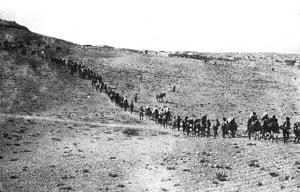
When the Armenian population of Asia Minor began drawing up plans for independence in the second half of the 19th century, the Ottoman Empire responded with a series of brutal repressions. These culminated in the genocide of 1915–1917, which, according to various sources, resulted in the deaths (a result of massacres and atrocities; exhaustion, lack of food and water) of between 800,000 and 1.5 million Armenians. Modern Turkey government refuses to attribute the responsibility for this to their 20th century counterpart, officially considering it a side effect of resettlement, justified by acts of terror and collaboration of Armenians with hostile powers. It also doesn't maintain official relations with Armenia, a country that Turkey shares almost 200 miles of border to the north-east. Azerbaijan has an even more hostile attitude to Armenia, and the two countries have been engaged in an intermittent dispute over Nagorno-Karabakh (Artsakh), most recently reignited in September of 2020. The Azeris are actively supported in this fight by Turkey, as the two republics are closely aligned politically, culturally and linguistically.
The first thing to get our of the way is that Maroon Berets: 2030 is not propaganda with a capital P, financed by the government of the Republic of Turkey and presented at conventions of neo-fascist militias like the Gray Wolves. This game is actually the the work of a single developer – his limited activity in social media paints a picture of a young boy who, having emigrated to the other end of the globe, builds his identity on national pride taken to the extreme. His game naturally draws from this ideology. He would probably never call himself a nationalist propagandist, but after letting his work speak for itself... you can hear the same phrases you'd expect from Turkish fringe groups.
Maroon Berets: 2030 presents, above all, an extremely simplified, binary vision of reality. In 2020 – thanks to crucial assistance of Turkish drones, which is emphasized by literally every other sentence uttered in the game – Armenia is humiliated in the Nagorno-Karabakh War. In its aftermath, an "almost emotionless ex-military" seizes the power, as the narrative portrays him. The new president apparently has no intention of playing with any diplomatic solutions and after ten years of increased militarization of the country, he finally declares war on the benign Turkey. “People of Armenia,” he asks at his rally. "Aren't you bored of being a peaceful country?" The apparent response is a resounding "Fu** yeah!" because just three missions later, Iskanders are already getting tossed across the Turkish border, and Istanbul is threatened with nuclear annihilation.
This is, of course, a preposterous vision, a sort of political fiction too grotesque even for an Austin Powers movie. But realism is the least of propaganda's concerns: it's exaggerated on purpose, the entire point of the message is to be dead-simple, taping into the emotions, fears and stereotypes already rooted in the recipients. And on the Bosphorus, anti-Armenian sentiment is more of a rule than exception: the caricature of a treacherous Armenian who plots and bends over backwards to tarnish the good name of the Turkish nation is still popular among the public.
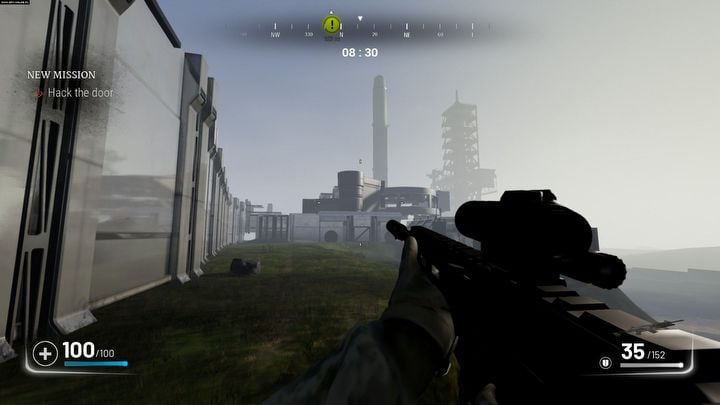
In just ten years, Armenia manages to build a nuclear program from scratch. Iran would like to borrow the notes.
Maroon Berets: 2030 takes full advantage of this imagery. The game doesn't even kick into the third gear before the father of the protagonist dies in an explosion of an Azerbaijani house, blown up by the Armenian army – an act that's considered a war crime (and repeatedly committed by Russia in Ukraine throughout 2022). It only gets worse: Armenia wants to hit critical infrastructure, threatening to flood innocent Turkish villages, plans to drop a nuclear bomb on Istanbul, kidnaps soldiers and conducts brutal experiments on them, and sponsors rebels, who happen to be the not-so-subtle equivalent of the Kurdish fighters.
In one of the missions, we get to a research facility behind enemy lines, and find hostages are being held there. Massacred bodies of Turkish soldiers hang there on hooks, dismembered corpses serve as props in propaganda recordings, there are gallons of blood spilled on the floors. Armenian soldiers are oftentimes portrayed not as people "the other side of a long-standing conflict" in Maroon Berets: 2030, but rather as sadists straight from a gore horror movie, who need to be executed, because arguing with such monsters would be a crime.
The Turkish special forces, on the other hand, are always decent guys: ready to sacrifice, able to prevent a nuclear attack and expose espionage activities, as well as to drive around in circles recovering cryptocurrency (sic!) for the people living in a village near their base. They can conduct a covert operation in a hostile country, execute a hostile insurgent using "enhanced interrogation techniques," execute war criminals without due process – and they are fully justified in doing so. The game won't say a bad word about him. Anyway – it's dedicated to the shahids, soldiers killed in action defending "peace in the country, peace in the world." There's no room for no moral shades of gray here.
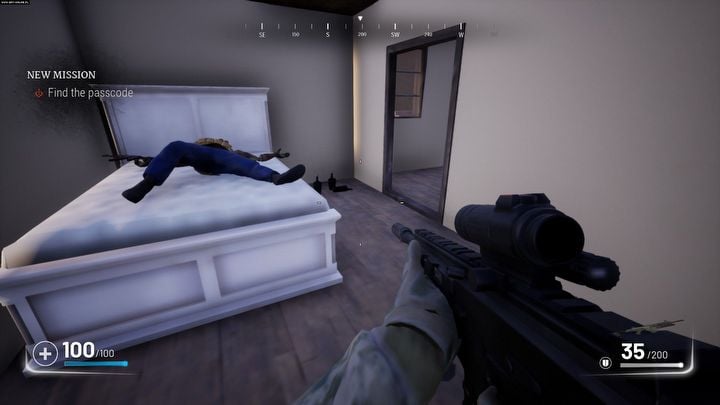
The most flattering picture of an anti-Turkish rebel: he may be drunk in a stupor, but he won't let the rifle out of his hand.
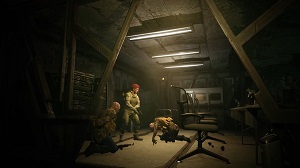
As crude as the ideology
Honestly, I'm not sure I could separate the quality of Maroon Berets: 2030 purely as entertainment from the message it tries to push through if it was a good game. Fortunately, I don't have to, because it's as bad as the ideology that pours out of it. And it's not because it's far lacking in terms of visuals compared to AAA hits, it's full of bugs and lasts for two, maybe three hours. It's a game prepared independently by a single person – and taking that into account, it can impress at least with its sheer scale. However, its design is horribly boring.
All of the marginally interesting missions, such as rescuing prisoners from an Armenian research facility or stopping the launch of a nuclear bomb, happen within the first hour, and even they contain a bunch of frustrating solutions, backtracking and long fragments void of any semblance of engaging action. The rest of the game is an endless drive through an empty, uninteresting map from point A to B just to shoot at a few dumb opponents for a while. It's not that I wish there were more proficient, radical game-developers out there, but if a propaganda game si the best you've got, at least don't make it so... bland.
The creator also doesn't care about subtlety when it comes to symbolism. The only Turkish town in the game is very tradition and very idyll, but the outposts of the Armenian army turn out to be militarized in a futuristic way, making Bond villains go "whoa." Masked Armenians and rebels give the impression of faceless robots, while the companion from the Turkish army that follows us only has a good-ol uniform and the title crimson beret. The game also makes extensive use of emblems of Turkishness: quotes from the first president and the main ideologue of the republic – Mustafa Kemal Atatürk, and at one point in one of the missions, it has us spend a good two minutes of a secret operation taking down the giant Armenian flag flying on the mast and replacing it with the Turkish one.
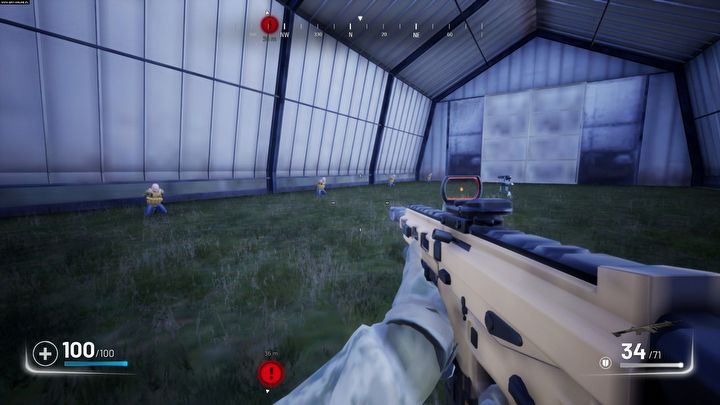
In the mission after the credits, we can execute incapacitated "war criminals." If we have earned enough experience points during the campaign, we get a machine gun for this purpose.
For an audience outside this cultural sphere, Maroon Berets: 2030 will simply be a naive game with a (perhaps overly enthusiastic) patriotic message. But if you look at the forums or reviews, anti-Armenian sentiments regularly pour out of them. If "by their fruits you shall know them" – then the fruit of this production is to sharpen the discourse between players from Turkey and players from Armenia. Maroon Berets: 2030 evokes strong, hostile emotions completely unrelated to the quality of the game itself. It is based solely on preexisting stereotypes, prejudices and fears. It presents a black-and-white version of a complicated, long-standing conflict, grappling with a sense of national pride and targeting groups that Turkish nationalists have identified as a threat for many years. As such, it is the very definition of propaganda.
The discussion was not aided by the fact that the Armenian media started to criticize the game without getting to know it, claiming that Maroon Berets: 2030 depicts and praises executions of prisoners of war captured by the Turks, and that during the campaign we invade the provinces of Armenia – whereas none of this takes place in the game. As a result, a cavalcade of players who weren't even remotely interest in the game itself, but rather wanted to engage in nationalistic spats that were set off on the channels and forums dedicated to this production. It's a pity that sensationalism was the callout method, because an Armenian writer could probably conduct a much more in-depth vivisection of the game, pointing the elements of xenophobic symbolism and nationalist dog whistles. Instead, players fell into arguments over a smear campaign, resulting from oversensitivity and national complexes, and not from knowledge of the subject matter.
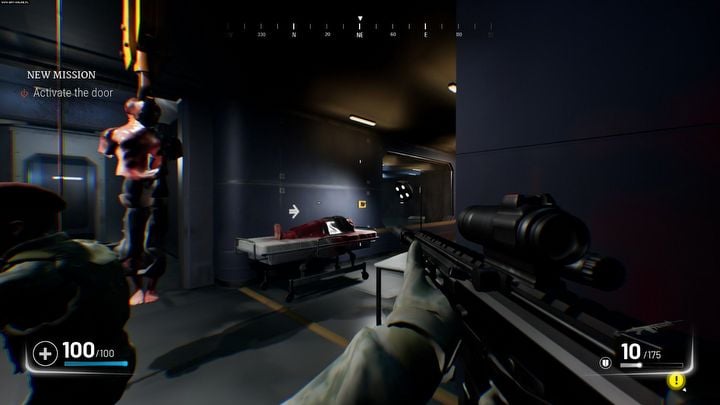
And believe me, there is enough material here to offend national feelings without inventing bogus reasons.
And yes, I realize that this is likely the first and last piece on Maroon Berets: 2030 that you're going to read. So, in a way, I also contribute to perpetuating the game's message. But, you see, for me it is a fascinating case. There are very few productions that carry their ideology so bluntly and that present the vision of proposed reality so uncritically. Even few meet the requirements of a propaganda creation openly hateful towards a particular nation in so many respects. Maroon Berets: 2030 is a bad game, of course, but it's an interesting topic for discussion. However, I have a feeling that it will soon cease to be one, and in the face of countries such as Russia or China (if only!), which have been raising the need to create "patriotic" interactive entertainment for years, we will soon have so many indoctrination campaigns that keeping up with analyzing them could become tricky.
- Shroud says ARC Raiders devs have lost control. The studio issues a statement
- Call of Duty fans can't believe their eyes. Activision releases a remastered version of the Black Ops 2 map that looks worse than the original from 14 years ago
- New version of Black Mesa: Military has been released, offering numerous improvements
7

Author: Jakub Mirowski
Associated with Gamepressure.com since 2012: he worked in news, editorials, columns, technology, and tvgry departments. Currently specializes in ambitious topics. Wrote both reviews of three installments of the FIFA series, and an article about a low-tech African refrigerator. Apart from GRYOnline.pl, his articles on refugees, migration, and climate change were published in, among others, Krytyka Polityczna, OKO.press, and Nowa Europa Wschodnia. When it comes to games, his scope of interest is a bit more narrow and is limited to whatever FromSoftware throws out, the more intriguing indie games and party-type titles.
Latest News
- Huge Marvel Adventures mod now with new superheroes, including Sentry
- Butcher's Summit, an impressive free diselpunk FPS, has been released
- Free FPS on Half Life engine gets big update
- On February 3, gaming history could change forever. Red Dead Redemption 2 one step away from a major achievement
- This is not the RPG you expected. Crimson Desert abandons the key elements of the genre, going for original solutions
